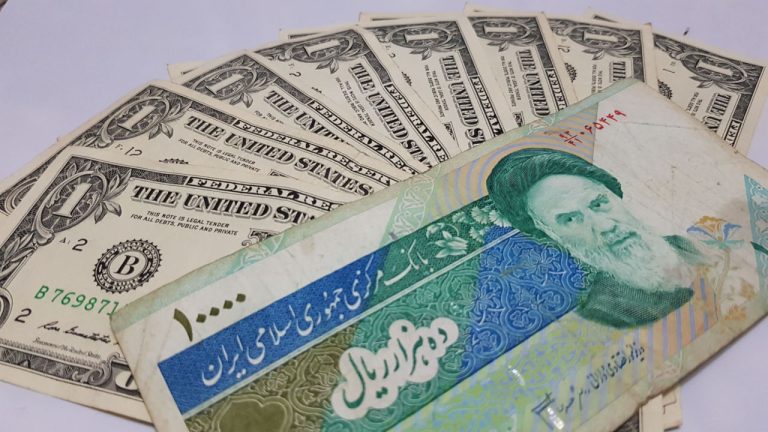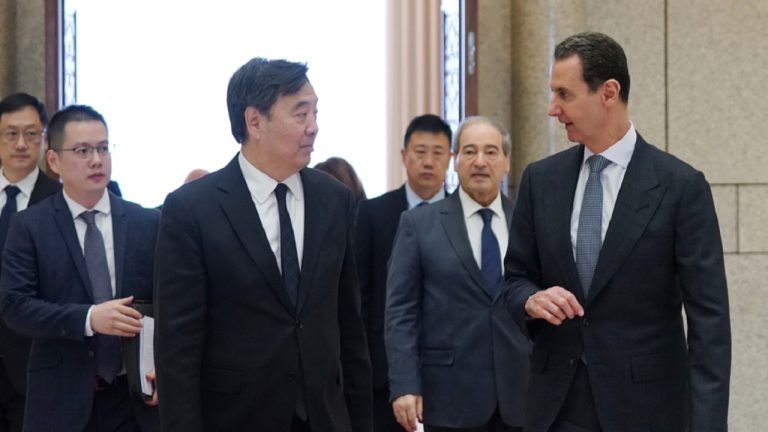 Iranian president Ebrahim Raisi has called on the Central Bank of Iran to lay the groundwork necessary to ditch the U.S. dollar for bilateral trade settlements and to make the switch to use the Iranian real whenever possible. The Central Bank of Iran has already started implementing this policy, proposing to pay bilateral trades using […]
Iranian president Ebrahim Raisi has called on the Central Bank of Iran to lay the groundwork necessary to ditch the U.S. dollar for bilateral trade settlements and to make the switch to use the Iranian real whenever possible. The Central Bank of Iran has already started implementing this policy, proposing to pay bilateral trades using […] BRICS nations can lead efforts to abandon the U.S. dollar in international settlements, according to President Bashar Assad of Syria. At a meeting with China’s top diplomat for the region, the leader of the war-torn Middle Eastern country called for using the Chinese yuan for cross-border trade. Economic Clash With West Requires Discarding Dollar, BRICS […]
BRICS nations can lead efforts to abandon the U.S. dollar in international settlements, according to President Bashar Assad of Syria. At a meeting with China’s top diplomat for the region, the leader of the war-torn Middle Eastern country called for using the Chinese yuan for cross-border trade. Economic Clash With West Requires Discarding Dollar, BRICS […] On Tuesday, all four major U.S. benchmark stock indexes fell as real estate data showed home sales dropped by 0.7% last month and Russian President Vladimir Putin suspended the nuclear arms control treaty with the United States. Additionally, the chief U.S. equity strategist at Morgan Stanley said the stock market is in a “death zone” […]
On Tuesday, all four major U.S. benchmark stock indexes fell as real estate data showed home sales dropped by 0.7% last month and Russian President Vladimir Putin suspended the nuclear arms control treaty with the United States. Additionally, the chief U.S. equity strategist at Morgan Stanley said the stock market is in a “death zone” […]
The Web3 ecosystem came together to offer all possible help and aid to the victims of the Turkish-Syrian earthquake — one of the worst natural disasters in recent history.
Welcome to Finance Redefined, your weekly dose of essential decentralized finance (DeFi) insights — a newsletter crafted to bring you significant developments over the last week.
In the aftermath of a deadly 7.8-magnitude earthquake in southeastern Turkey, the Web3 community has come together to raise awareness and aid for disaster victims.
Stablecoins could prove to be a critical factor in larger DeFi adoption, says Aave founder Stani Kulechov. According to the Aave executive, building the “payment layer,” which involves stablecoins, can potentially hook regular people into the space, eventually introducing them into DeFi. On the other hand, S&P Global Ratings believe DeFi protocols can attract institutional interest if they get securitization right.
Venture capital firm Andreessen Horowitz (a16z) used 15 million Uniswap (UNI) tokens to vote against the deployment of Uniswap v3 on BNB Chain using the Wormhole bridge. Web3 developer ConsenSys has cast 7.03 million UNI votes in favor of its deployment on BNB Chain.
The DeFi market broke its four-week bullish streak after news about Kraken settling with the United States Securities and Exchange Commission and winding down its crypto staking services. The settlement means U.S.-based exchanges must shut down their staking services, which has come at a critical time for Ethereum, as the upcoming Shanghai upgrade will allow Ether (ETH) stakers to withdraw their staked ETH.
A massive earthquake hit southeastern Turkey along the border with Syria on Feb. 6, which has so far caused the death of more than 18,000 people. The quake registered a magnitude of 7.8 on the Richter scale, which is internationally categorized as a “major” earthquake, and occurred along 100 kilometers of the fault line.
Infrastructure in the area suffered significant damage, resulting in a deadly cross-border humanitarian disaster. However, the world was quick to respond. Across the internet and various social media platforms, people have been gathering funds for local and international aid organizations to provide relief to those in the affected areas.
Stani Kulechov, the founder of the DeFi protocol Aave, highlighted several issues within the DeFi space at the StarkWare Sessions 2023, held at The Cameri Theatre in Tel Aviv, Israel.
In a fireside chat titled “DeFi: Resilience in the Face of Global Uncertainty,” Kulechov and Cointelegraph’s managing editor Alex Cohen discussed various topics, including DeFi’s risks compared to traditional finance and how stablecoins can lead to more DeFi adoption.
DeFi’s use case in traditional finance could grow in the coming years as new protocols attempt to support the securitization of real-world assets, according to a new research report from credit rating agency S&P Global Ratings.
The financing of real-world assets will likely be a key focus area for DeFi protocols moving forward, S&P said in a report titled “DeFi Protocols For Securitization: A Credit Risk Perspective.” Although the industry is still in its nascent stages, S&P highlighted several benefits DeFi could bring to securitization, including reducing transaction costs, improving transparency on asset pools, reducing counterparty risks and enabling faster payment settlement for investors.
Venture capital firm a16z voted against a final proposal to deploy Uniswap v3 on the BNB Chain using the Wormhole bridge, the Uniswap DAO forum shows.
The governance proposal to deploy the latest Uniswap iteration on the BNB Chain was submitted on Feb. 2 by 0xPlasma Labs on behalf of the Uniswap Community after it passed a temperature check with 20 million (80.28%) votes for yes, and 4.9 million (19.72%) votes for no. On Feb. 5, the venture firm used 15 million of its UNI holdings to vote against the move.
Web3 infrastructure developer ConsenSys, the maker of the popular MetaMask digital wallet, cast 7.03 million votes in favor of a proposal that would see decentralized exchange Uniswap’s v3 protocol deployed on BNB Chain, according to data from Tally.
As Cointelegraph reported, venture capital firm Andreessen Horowitz cast a vote against the proposal. A16z, which reportedly holds 55 million UNI tokens, voted 15 million UNI against the move due to its reliance on the Wormhole bridge. The VC firm instead supported using LayerZero as the interoperability protocol. LayerZero Labs is part of a16z’s portfolio and raised $135 million in a funding round in March 2022, with a $1 billion valuation.
Analytical data reveals that DeFi’s total market value fell back to $40 billion this past week, trading at about $40.1 billion at the time of writing. Data from Cointelegraph Markets Pro and TradingView shows that DeFi’s top 100 tokens by market capitalization had a bearish week, with most of the tokens bleeding this past week, registering double-digit losses on the weekly charts.

Thanks for reading our summary of this week’s most impactful DeFi developments. Join us next Friday for more stories, insights and education in this dynamically advancing space.
 On October 11, the U.S. Treasury department’s Financial Crimes Enforcement Network (FinCEN) and the Office of Foreign Assets Control (OFAC) announced that it has settled charges with the cryptocurrency exchange Bittrex. The crypto exchange was accused of sanctions violations and failure to “implement effective sanctions compliance controls” between March 2014 and December 2017. Crypto Exchange […]
On October 11, the U.S. Treasury department’s Financial Crimes Enforcement Network (FinCEN) and the Office of Foreign Assets Control (OFAC) announced that it has settled charges with the cryptocurrency exchange Bittrex. The crypto exchange was accused of sanctions violations and failure to “implement effective sanctions compliance controls” between March 2014 and December 2017. Crypto Exchange […] On Tuesday, a newly published report details that the cryptocurrency exchange Kraken is under federal investigation for allegedly violating U.S. sanctions, according to five people familiar with the matter. The unknown sources explained that the inquiry into Kraken started in 2019, and it’s accused of allowing users from sanctioned countries like Iran access to the […]
On Tuesday, a newly published report details that the cryptocurrency exchange Kraken is under federal investigation for allegedly violating U.S. sanctions, according to five people familiar with the matter. The unknown sources explained that the inquiry into Kraken started in 2019, and it’s accused of allowing users from sanctioned countries like Iran access to the […]
Yale graduate student Karam Alhamad created the ZeFi Foundation to educate future crypto users and address problems facing Syria and Iraq.
There is an educational website for beginning crypto users called ZeFi. The site has helpful introductory lessons, some interesting articles and a look of sincerity, much like other sites. However, none of it is that different — at least not in English. Its special feature is the language button in the upper right corner that reveals the Arabic version of the website.
“There is really nothing about blockchain in Arabic. […] And once you find something in Arabic, it is mostly influencers that are trying to pump and dump coins,” ZeFi founder and CEO Karam Alhamad said. The Arabic version of ZeFi is fuller than the English. It has culturally informed examples and starts with the very basics.
“ZeFi started with the idea of explaining what is money first” to people who “have never used banks, or credit cards or PayPal, people who have no sense of what money is,” Alhamad said. To figure out how to explain blockchain, Alhamad and his associates went to their grandmothers to start.
ZeFi began as a Telegram group and made its premiere online in March of this year. It also retains its connection to the telephone. Internet access is scarce in some of ZeFi’s service areas, which is mainly Syria and Iraq, but nearly everyone has a mobile telephone, Alhamad said.
Translation challenges were everywhere — bull markets and bear markets, for example. Even “blockchain” was hard to translate, and it was hard to explain against a background of monarchies and dictatorships, where the centralization of power and order is complete. Nonetheless, ZeFi developed vocabulary and is now working on a technical dictionary with graphics.
Alhamad is a first-year student at the Yale Jackson School of Global Affairs. He got there by a circuitous route that began at a Syrian college in 2011 when Alhamad was studying petroleum engineering and the Syrian uprising broke out.
The uprising was “a new purpose, a new goal,” he said.
Alhamad became an activist and was detained by authorities four times between 2011 and 2013. The fourth time, he was held for nearly a year in an overcrowded underground facility. But he was not deterred.
It was after his final imprisonment, when he was working for civic society groups, is when Alhamad first heard of cryptocurrency.

“It’s hard to send money,” he said. “I know it’s a very limited aspect of crypto in terms of transactions, but it’s really very hard, and back then we were trying to find other ways that we can receive money from donors.”
Alhamad had bigger things to worry about, though. The following year, he and his brother fled to Turkey and then created a website devoted to his experiences in Syria. Described as an animated graphic novel, it is indeed somewhat graphic, and also lyrical.
Alhamad received a liberal arts degree from Bard College Berlin, but was blocked from completing a degree in the United States by Donald Trump’s executive order, widely referred to as a “Muslim ban.” He got married and worked in development organizations.
In 2019, Alhamad began to think about the potential of blockchain technology for building a civil society. In 2020, he quit his job and set out to create his own nongovernmental organization (NGO), the ZeFi Foundation.
The ZeFi Foundation was in full swing by early 2022. It provided grants to Syrians to pay for university applications and related costs and led workshops for 22 civil society NGOs in Syria to talk about the political aspects of blockchain and how to use blockchain for human rights activism and organization. Using blockchain for data storage was another big topic.
“If you’re recording human rights atrocities of the regime, or even in opposition areas, you don’t want to use Google docs and suddenly have everything lost,” Alhamad said.
At ZeFi they talk very little about crypto trading, Alhamad said. This is unsurprising since opportunities for trading are limited in its focus area. The organization aims to develop the capacity of NGOs to use blockchain so they will be ready to take advantage of it “when it is completely legalized.”
Related: Human rights activists take aim at privileged crypto critics in letter to Congress
One of Alhamad’s hopes for blockchain is that it will help deliver more money to places that need it. With conventional money transfer systems, “everybody gets a cut” — subcontractors, operational costs and transfer fees eat into transfer sums, and sometimes less than 10% of the announced sum of a grant makes it to Syria, he said.
In the meantime, even as Alhamad studies in New Haven, there is plenty for the ZeFi Foundation to do. In areas controlled by the opposition in Syria, there are service gaps. It is a struggle to keep utilities and food distribution going and to meet similar needs that had been the responsibility of the government.
ZeFi is in talks with civil society groups in areas controlled by both the government and the opposition. It does not make all of its activities known, but Alhamad said ZeFi is discussing unifying vaccination records “even without getting any sort of political agreement from the military forces in these areas.” It is also in talks on using nonfungible tokens (NFTs) to record refugees’ educational and other qualifications.
Syria has already seen some blockchain applications. The United Nations has used blockchain to distribute food aid to refugees. A for-profit company called Hala Systems uses blockchain technology to manage user-provided event records. It also uses the information to provide air raid warnings to civilians via Telegram.